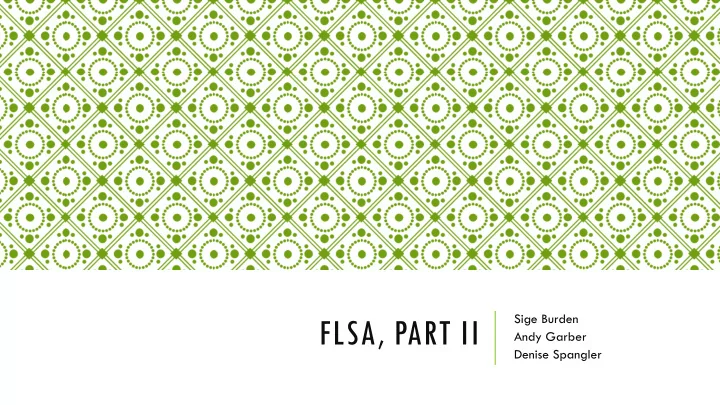

Sige Burden FLSA, PART II Andy Garber Denise Spangler
OUR GOAL Regardless of how or whether FLSA changes are implemented, our goal is for everyone to do their jobs at a highly professional level within a 40-hour work week. When situations arise where it is not possible to confine work to a 40-hour week, we need to determine whether this is a continuing issue, is episodic, or is a relatively rare event. This determines how we respond. Supervisors should foster a sense of trust where employees feel comfortable raising the issues if they believe they need more hours to complete assigned work. The dean’s office and HR are available to discuss solutions and alternatives.
FLSA INFORMATION https://flsa.uga.edu
STATUS OF FLSA Court injunction–still in process with no timeline UGA’s response/timeline–waiting on court decision Further consideration of positions (such as Student Affairs Professionals and Senior Accountants) in the future? All positions in a classification must be ruled exempt based on duties and salary. We will address priority areas through reclassification where feasible if the positions are not deemed exempt by HR. Reclassification plans Still being developed by HR. We assume no reclassifications will take place before July 1. Future plans for paycheck regularity OneSource/PeopleSoft will give us this possibility but not before 2019.
LUNCH AND BREAKS Minimum of 30 minutes of duty-free, unpaid lunch Two 15-minute breaks (paid time) when circumstances allow Cannot skip lunch to leave early as a regular work schedule Expected to work only an 8-hour day. With 30-60 minute lunch, you are here 8.5 or 9 hours. http://www.policies.uga.edu/FA/nodes/view/1207/Breaks-and-Meal-Periods
COMPENSATORY TIME Prior permission Emergency situations–notify supervisor as quickly as is feasible UGA policy http://www.policies.uga.edu/FA/nodes/view/1203/Overtime COE policy http://www.policies.uga.edu/FA/nodes/view/1203/Overtime COE approval form https://coe.uga.edu/intranet/offices/business
FLEX TIME Regular basis – requires prior approval via a form http://www.policies.uga.edu/FA/nodes/view/1206/Flextime Occasional flex time within a pay period is at the supervisor’s discretion. If the time cannot be accounted for within a pay period, it becomes comp time or leave.
TELECOMMUTING Regular basis requires a form and prior approval. Requirements for regular telecommuting Signed agreement Suitable workplace and tools http://www.policies.uga.edu/FA/nodes/view/1313/Telecommuting http://www.hrdocs.uga.edu/uga_telecommuting_conditions.pdf Occasional telecommuting (home with a sick child, for instance) is handled at the supervisor’s discretion in conjunction with leave.
EXEMPT STATUS AND SUPERVISION Supervisors are responsible for… Prioritizing workload Managing reasonable expectations & deliverables Managing time Managing their workforce If you are facing challenges, speak to your supervisor and then follow the chain of command if you need additional support. Supervisors should see support from unit heads, dean’s office, and HR.
UNEXPECTED SITUATIONS On unexpected leave (sick, for instance) and deadline arrives or urgent matter comes up What is the employee’s responsibility? What is the supervisor’s responsibility? If the employee is expected to respond, how is compensation handled? The basic rule of thumb is to do what makes sense and is fair. If the time can be handled through flexing time during the pay period or reducing leave, then do that. If not, it becomes comp time.
HOW DOES THE WORK GET DONE Note areas where there is more work than can be done in a 40-hour week. Is this consistent or episodic? Can we solve it through Efficiencies? Redistributing duties (maybe even across departments)? Cross training? Hiring seasonal workers? Supervisors should foster a sense of trust where employees feel comfortable raising the issues if they believe they need more hours to complete assigned work. Your unit head, the dean’s office, and HR are here to provide support in problem solving challenging situations.
Recommend
More recommend